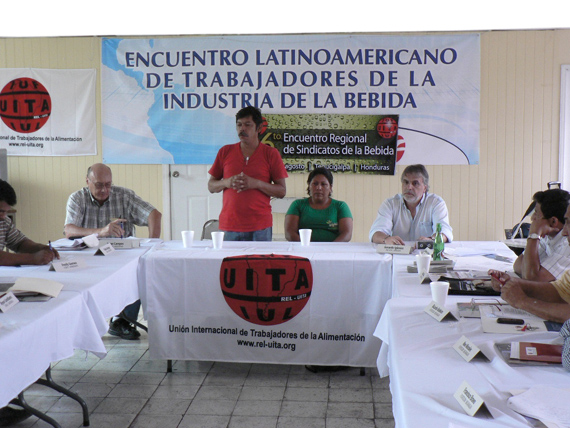|
“They want to
strangle
us financially so
they
can take our
land”
MUCA reports
landlords’ criminal strategy
|
The
recent murder of peasant leader Matías Valle Cárdenas is a clear sign that
Honduras’ private banking and agroindustrial interests are not willing to
relinquish the multi-million African palm business they want to pursue at the
expense of thousands of Bajo Aguán peasant families. And the government is
looking less and less like an innocent bystander.
On January 4, the
Finance Secretariat (SEFIN) presented the United Peasants Movement of
Aguán (MUCA) with a public and private bank loan proposal for the
purchase of 4,000 hectares of land, pursuant to the agreement signed with palm
producer and landowner Miguel Facussé in June 2011.
This proposal, which
was backed by the government and presented as the solution to the acute land
conflict that has so far cost the lives of 45 organized peasants, is seen
by MUCA as part of a plan to bury the peasants in debt and strangle them
financially, so that the large landowners can take their lands away from them.
MUCA
would, in fact, be facing a total debt of two billion lempiras (105 U.S.
dollars) with Banco Ficohsa (a private bank) and Banhprovi (a
public). Which is why MUCA members say it is a proposal designed to favor
“the consortium of private banks involved in the transaction.”
“It is a scheme to
undermine our struggle and eliminate us. They failed in their attempt to
exterminate us with guns, so now they’re taking another shot us and trying to
strangle us financially to drive us off our lands,” MUCA General
Secretary Yoni Rivas told Sirel.
| |
|
| |
The only ones who will profit from this proposal are Miguel Facussé
and the private banks. Facussé will receive 540 million lempiras
(28.5 million U.S. dollars) for the sale of his land and the banks
will reap an exaggerated profit, further impoverishing peasants. |
| |
|
According to this
peasant leader, if this proposal were to be accepted the more than 3,000
families that are part of MUCA would become so indebted the banks would
practically own them.
“This is the reason we
are turning it down, because it’s inhuman, and we are asking that the State use
public funds to finance the purchase of the land at low interest rates,”
Rivas said.
The
conflict could escalate
For FIAN Honduras
Executive Director Gilberto Ríos the proposal presented by SEFIN
and the private banks is completely ridiculous.
“The problem is
deep-rooted. It’s based on an excessive value calculated for a hectare planted
with African palm, and the same value is calculated for unproductive hectares
with overpopulated settlements that have little land per capita,” Ríos
explained.
Moreover, experts in
the sector say that a family needs at least seven hectares to have a decent
income to live on. “There are settlements where a family has less than one
hectares. How can this proposal be sustainable then?” the FIAN Honduras
officer wondered.
It is obvious to him
that this financial transaction will benefit the usual people.
“The only ones who will
profit from this proposal are Miguel Facussé and the private banks.
Facussé will receive 540 million lempiras (28.5 million U.S. dollars) for
the sale of his land and the banks will reap an exaggerated profit, further
impoverishing peasants,” Ríos said.
In view of this,
FIAN Honduras calls for the National Agricultural Institute (INA) to
use proper mechanisms to allocate new lands and reassess the hectares already
allocated, and for peasant loans to be granted by the State.
“If a genuine solution
to the problem is not found soon, a solution that includes all the peasant
groups involved, the conflict could escalate again,” Ríos concluded.
 |